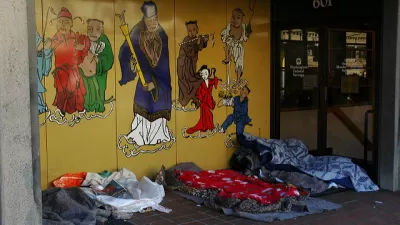What might have been a business story about the failure of a local coffee chain - and not a small one at that - to compete against the mighty Starbucks becomes more of a description of what Seattle is all about, and urbanity plays a major role.
The bankrupt, Seattle-based 200-store chain in the western U.S. is Tully's, which had been purchased by Green Mountain coffee in Oct, 2008. In addition to comparing the two chains - and why Tully's couldn't compete with the ubiquitous Starbucks, Kirk Johnson explores how coffee took-off in Seattle, of all places.
"Why Seattle became synonymous with coffee at all... is a chicken-and-egg question if ever there were one. Did coffee become huge here because the place so needed stimulants - a chemical restorative to the gloomy damp - or was it on some level a marketing creation that became real over time by force of repetition?
The ‘idea of Seattle' was, and is, an idea of urban livability that lives on in the DNA of every upscale coffee retailer, whether they think of it that way and acknowledge it or not," said James Lyons, a senior lecturer in the English department at the University of Exeter in England and author of "Selling Seattle," a book about how Seattle identity and Seattle products, from coffee to grunge music, was harnessed together for fun and profit."
"Every time I see a new, independent coffee store opt for outfacing window seating, so you can sip your latte and watch the world go by, the store owes a debt to Starbucks and its origins in Seattle," Dr. Lyons said in an e-mail.
For Tully's patrons - according to President and CEO Scott Pearson, "the company wil continue to operate and hopes to emerge from bankruptcy protection next year".
FULL STORY: Struggling Against a Venti Starbucks Tide

Maui's Vacation Rental Debate Turns Ugly
Verbal attacks, misinformation campaigns and fistfights plague a high-stakes debate to convert thousands of vacation rentals into long-term housing.

Planetizen Federal Action Tracker
A weekly monitor of how Trump’s orders and actions are impacting planners and planning in America.

Chicago’s Ghost Rails
Just beneath the surface of the modern city lie the remnants of its expansive early 20th-century streetcar system.

Bend, Oregon Zoning Reforms Prioritize Small-Scale Housing
The city altered its zoning code to allow multi-family housing and eliminated parking mandates citywide.

Amtrak Cutting Jobs, Funding to High-Speed Rail
The agency plans to cut 10 percent of its workforce and has confirmed it will not fund new high-speed rail projects.

LA Denies Basic Services to Unhoused Residents
The city has repeatedly failed to respond to requests for trash pickup at encampment sites, and eliminated a program that provided mobile showers and toilets.
Urban Design for Planners 1: Software Tools
This six-course series explores essential urban design concepts using open source software and equips planners with the tools they need to participate fully in the urban design process.
Planning for Universal Design
Learn the tools for implementing Universal Design in planning regulations.
planning NEXT
Appalachian Highlands Housing Partners
Mpact (founded as Rail~Volution)
City of Camden Redevelopment Agency
City of Astoria
City of Portland
City of Laramie




























